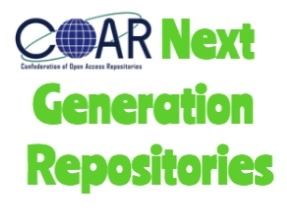Technical Recommendations of the COAR Next Generation Repositories Working Group
04/12/2017


On 28 November, 2017, the COAR published the report "Behaviours and Technical Recommendations of the COAR Next Generation Repositories".
The report presents the results of the work of this group, including recommendations for the adoption of new technologies, standards, and protocols that will help repositories become more integrated into the web environment and enable them to play a larger role in the scholarly communication ecosystem.
|
One of COAR’s major objectives for 2016-17 was to identify the core functionalities and behaviours for the next generation of repositories, as well as the architectures and technologies required to implement them; and to work with the repository community to help adopt these functionalities. |
COAR’s RECOMMENDATIONS FOR NEXT GENERATION REPOSITORIES
The report "Behaviours and Technical Recomendations of the COAR Next Generation Repositories Working Group" describes 11 new behaviours, as well as the technologies, standards and protocols that will facilitate the development of new services on top of the collective network, including social networking, peer review, notifications, and usage assessment.
|
1. |
Exposing Identifiers |
7. |
Collecting and Exposing Activity Metadata |
|
2. |
Declaring Licenses at a Resource Level |
8. |
Identification of Users |
|
3. |
Discovery through Navigation |
9. |
Authentication of Users |
|
4. |
Interact with Resources (Annotation, Commentary and Review) |
10. |
Exposing Standardized Usage Metrics |
|
5. |
Batch Discovery |
11. |
Preservation of Resources |
|
6. |
Resource Transfer |
|
|
COAR very much hopes that the recommendations provided in this report will contribute to the transition towards next generation repositories and libraries.
HOW SHOULD REPOSITORIES BE POSITIONED IN THE FUTURE ?
COAR’s vision:
- is to position repositories as the foundation for a distributed, globally networked infrastructure for scholarly communication, on top of which layers of value added services will be deployed, thereby transforming the system, making it more research-centric, open to and supportive of innovation, while also collectively managed by the scholarly community;
- is aligned with others, such as MIT’s Future of Libraries Report and Lorcan Dempsey’s notion of the “inside-out” library, that are defining a new role of libraries in the 21st century;
- needs to be supported by a wider array of roles and functionalities, which can be enabled through new levels of web-centric interoperability.
An important component of this vision is that repositories will provide access to a wide variety of research outputs, creating the conditions whereby a greater diversity of contributions to the scholarly record will be accessible, and also formally recognized in research assessment processes.
COAR believes that the globally distributed network of more than 3000 repositories can be leveraged to create a more sustainable and innovative system for sharing and building on the results of research.
Collectively, repositories can provide a comprehensive view of the research of the whole world, while also enabling each scholar and institution to participate in the global network of scientific and scholarly enquiry. Building additional services such as standardized usage metrics, peer review and social networking on top of a trusted global network of repositories has the potential to offer a viable alternative.
|
COAR’s mission is to ensure that, as libraries and research organizations invest in and enhance their local services, adopt common standards and functionalities that will allow them to participate in the global network. The COAR Next Generation Repositories Working Group was launched in April 2016, to identify new functionalities and technologies for repositories. The work of this group is based on a set of principles and design assumptions. COAR Next Generation Repositories user stories. |
Source: Next Generation Repositories
Related: COAR Controlled Vocabularies presented at the Open Science FAIR 2017 International Conference
